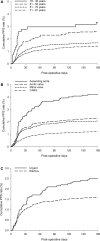Occurrence of Postpericardiotomy Syndrome: Association With Operation Type and Postoperative Mortality After Open-Heart Operations
- PMID: 30571490
- PMCID: PMC6404434
- DOI: 10.1161/JAHA.118.010269
Occurrence of Postpericardiotomy Syndrome: Association With Operation Type and Postoperative Mortality After Open-Heart Operations
Abstract
Background Postpericardiotomy syndrome ( PPS ) is a common complication after cardiac surgery. However, large-scale epidemiological studies about the effect of procedure type on the occurrence of PPS and mortality of patients with PPS have not yet been performed. Methods and Results We studied the association of PPS occurrence with operation type and postoperative mortality in a nationwide follow-up analysis of 28 761 consecutive patients entering coronary artery bypass grafting, aortic valve replacement, mitral valve replacement, or ascending aortic surgery. Only PPS episodes severe enough to result in hospital admission or to contribute as a cause of death were included. Data were collected from mandatory Finnish national registries between 2005 and 2014. Of all the patients included, 493 developed PPS during the study period. The occurrence of PPS was significantly higher after aortic valve replacement (hazard ratio, 1.97; 95% confidence interval, 1.58-2.46; P<0.001), mitral valve replacement (hazard ratio, 1.62; 95% confidence interval, 1.22-2.15; P<0.001), and aortic surgery (hazard ratio, 3.06; 95% confidence interval, 2.24-4.16; P<0.001), when compared with coronary artery bypass grafting in both univariable and multivariable analyses. The occurrence of PPS decreased significantly with aging ( P<0.001). The occurrence of PPS was associated with an increased risk of mortality within the first year after the surgery (adjusted hazard ratio, 1.78; 95% confidence interval, 1.12-2.81; P=0.014). Conclusions The occurrence of PPS was higher after aortic valve replacement, mitral valve replacement, and aortic surgery when compared with the coronary artery bypass grafting procedure. Aging decreased the risk of PPS . The development of PPS was associated with higher mortality within the first year after cardiac or ascending aortic surgery.
Keywords: epidemiology; mortality; pericardium; postpericardiotomy syndrome; thoracic surgery.
Figures



Comment in
-
Post-Pericardiotomy Syndrome: Beware or Just Be Aware?J Am Heart Assoc. 2018 Nov 20;7(22):e011118. doi: 10.1161/JAHA.118.011118. J Am Heart Assoc. 2018. PMID: 30571507 Free PMC article.
Similar articles
-
Adverse events and survival with postpericardiotomy syndrome after surgical aortic valve replacement.J Thorac Cardiovasc Surg. 2020 Dec;160(6):1446-1456. doi: 10.1016/j.jtcvs.2019.12.114. Epub 2020 Jan 28. J Thorac Cardiovasc Surg. 2020. PMID: 32107032
-
Outcomes of concomitant aortic valve replacement and coronary artery bypass grafting at teaching hospitals versus nonteaching hospitals.J Thorac Cardiovasc Surg. 2012 Mar;143(3):648-55. doi: 10.1016/j.jtcvs.2011.04.041. Epub 2011 Jun 30. J Thorac Cardiovasc Surg. 2012. PMID: 21719032
-
Postpericardiotomy syndrome incidence, diagnostic and treatment strategies: experience AT two collaborative centers.Acta Clin Croat. 2019 Mar;58(1):57-62. doi: 10.20471/acc.2019.58.01.08. Acta Clin Croat. 2019. PMID: 31363326 Free PMC article.
-
Postpericardiotomy syndrome after cardiac surgery.Ann Med. 2020 Sep;52(6):243-264. doi: 10.1080/07853890.2020.1758339. Epub 2020 May 2. Ann Med. 2020. PMID: 32314595 Free PMC article. Review.
-
Predictors and Outcomes of Prosthesis-Patient Mismatch After Aortic Valve Replacement.JACC Cardiovasc Imaging. 2016 Aug;9(8):924-33. doi: 10.1016/j.jcmg.2015.10.026. Epub 2016 May 25. JACC Cardiovasc Imaging. 2016. PMID: 27236530 Review.
Cited by
-
Post-Pericardiotomy Syndrome: Beware or Just Be Aware?J Am Heart Assoc. 2018 Nov 20;7(22):e011118. doi: 10.1161/JAHA.118.011118. J Am Heart Assoc. 2018. PMID: 30571507 Free PMC article.
-
Post-cardiac Injury Syndrome in a Systemic Lupus Erythematosus Patient After an Open-Heart Operation: A Case Report.Cureus. 2023 Sep 27;15(9):e46077. doi: 10.7759/cureus.46077. eCollection 2023 Sep. Cureus. 2023. PMID: 37900378 Free PMC article.
-
Predictive Role of Systemic Inflammatory Indices in Surgically Managed Postpericardiotomy Syndrome Following Cardiac Surgery.Diagnostics (Basel). 2025 Jun 11;15(12):1488. doi: 10.3390/diagnostics15121488. Diagnostics (Basel). 2025. PMID: 40564808 Free PMC article.
-
Acute pericarditis after transabdominal cardiophrenic lymph node dissection and pericardotomy during ovarian cancer debulking surgery: A case report.Gynecol Oncol Rep. 2020 Dec 11;35:100683. doi: 10.1016/j.gore.2020.100683. eCollection 2021 Feb. Gynecol Oncol Rep. 2020. PMID: 33364288 Free PMC article.
-
Incidence of secondary pericardial effusions associated with different etiologies: a comprehensive review of literature.J Cardiothorac Surg. 2025 Feb 22;20(1):141. doi: 10.1186/s13019-025-03370-5. J Cardiothorac Surg. 2025. PMID: 39987086 Free PMC article. Review.
References
-
- Imazio M. The post‐pericardiotomy syndrome. Curr Opin Pulm Med. 2012;18:366–374. - PubMed
-
- Imazio M, Spodick DH, Brucato A, Trinchero R, Adler Y. Controversial issues in the management of pericardial diseases. Circulation. 2010;121:916–928. - PubMed
-
- Miller RH, Horneffer PJ, Gardner TJ, Rykiel MF, Pearson TA. The epidemiology of the postpericardiotomy syndrome: a common complication of cardiac surgery. Am Heart J. 1988;116:1323–1329. - PubMed
-
- van Osch D, Dieleman JM, Bunge JJ, van Dijk D, Doevendans PA, Suyker WJ, Nathoe HM; Dexamethasone for Cardiac Surgery Study Group . Risk factors and prognosis of postpericardiotomy syndrome in patients undergoing valve surgery. J Thorac Cardiovasc Surg. 2017;153:878–885. - PubMed
-
- Imazio M, Brucato A, Rovere ME, Gandino A, Cemin R, Ferrua S, Maestroni S, Barosi A, Simon C, Ferrazzi P, Belli R, Trinchero R, Spodick D, Adler Y. Contemporary features, risk factors, and prognosis of the post‐pericardiotomy syndrome. Am J Cardiol. 2011;108:1183–1187. - PubMed
Publication types
MeSH terms
LinkOut - more resources
Full Text Sources
Medical

